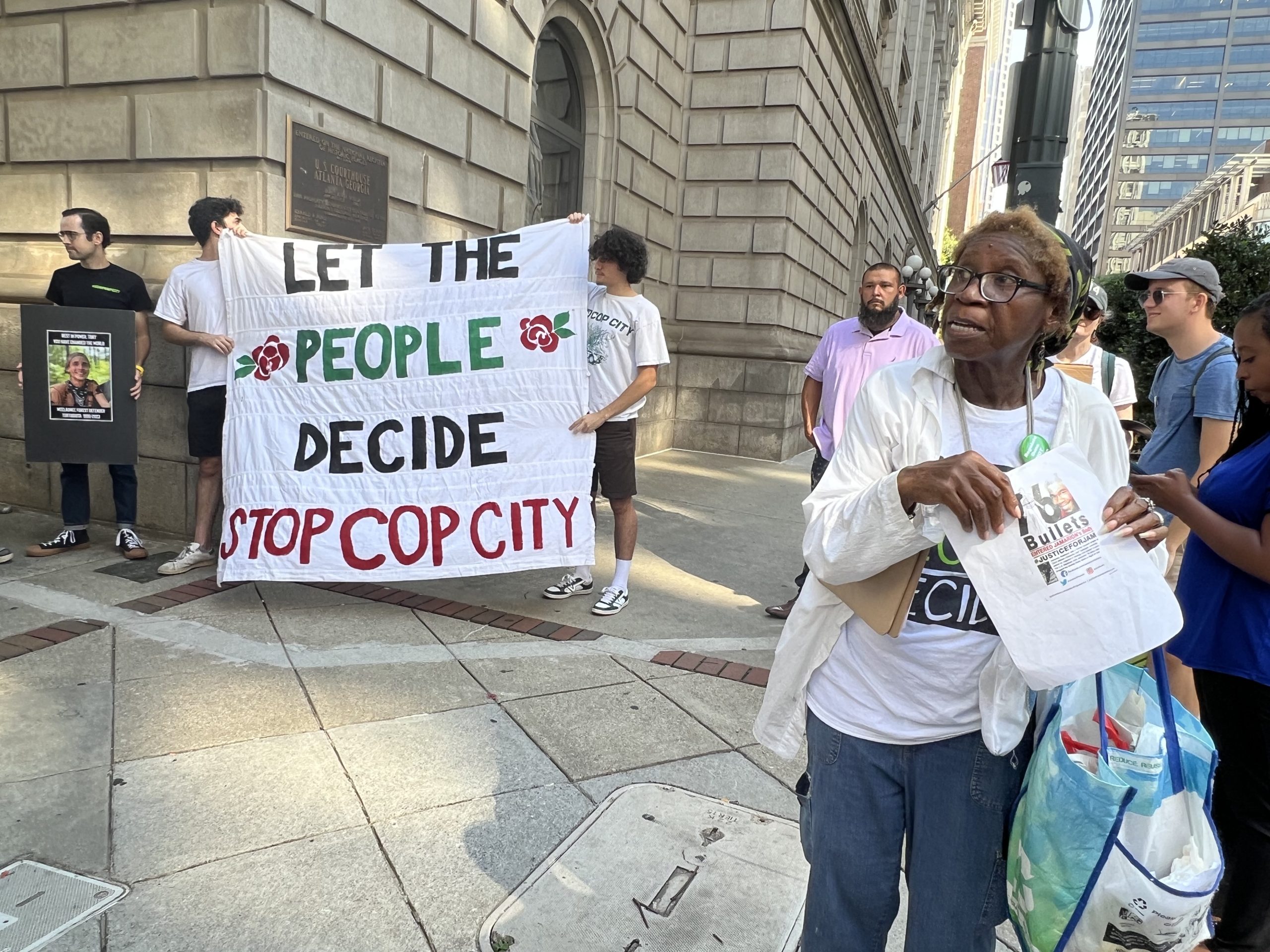On Monday, opponents of the proposed Atlanta Public Safety Training Center scuttled plans to submit over 100,000 signatures to the city of Atlanta for its petition for a citywide referendum. Instead, organizers said they’ll hold off until Sept. 23 to collect even more signatures, in case the city moves to invalidate a sizable portion of them.
That would likely doom the referendum’s chance of appearing on the November ballot, instead delaying it until March.
“We’ve collected over 104,000 raw signatures around the city of Atlanta — from Southwest to Buckhead — and the people have decided. Cop City must be put on the ballot,” said Mary Hooks in the Vote to Stop Cop City coalition’s Aug. 21 announcement. Hooks is a lead organizer and spokesperson for the coalition.
But the coalition said they’re concerned the city won’t actually do so, citing “the city of Atlanta’s open and ongoing hostility to the Cop City Vote referendum effort.”
Signature Check
As proof, they’re citing Interim Municipal Clerk Vanessa Waldon’s Aug. 21 announcement that the city will use so-called “signature checks” to verify the petition signatures – by comparing a signature on the petition to that on the signer’s voter registration.
Some voting rights experts have described this controversial process as “witchcraft” that disenfranchises voters, because it often results in signatures getting thrown out over minute discrepancies. In 2018, the ACLU successfully sued the state of Georgia for rejecting close to 600 absentee ballots for alleged signature mismatches.
“Signature matching is a tool of voter suppression—plain and simple,” wrote New Georgia Project Action Fund CEO Kendra Cotton in a press release. “The City of Atlanta’s use of this arcane method to verify petition signatures in the push to get a referendum on Cop City on the ballot is the same method used for years by the GOP to throw out valid ballots cast by Georgia voters. It’s the same method that the State of Georgia stopped using because they had been sued so many times on this unfair, skewed, and politically motivated practice.”
In a legal memo also distributed Monday, the coalition listed ways the city could ensure a fair and objective verification. Their recommendations include using neutral observers and regularly reporting the vetting results back to the Vote to Stop Cop City organizers, so they could correct any signature errors.
“We’ve laid out what the law calls for and what morality calls for — it’s up to the city now to honor the will of the voters,” said Kurt Kastorf, a lawyer representing the coalition, in the press release.
Extended Deadline
The coalition’s previous goal was to submit 70,000 signatures from Atlanta residents who’re registered voters by Aug. 21 – 60 days after the municipal clerk certified their petition for a referendum. That is to satisfy a requirement in the city code that the petition must be signed by “15% of the registered voters qualified to vote in the preceding general municipal election.”
But the original deadline was extended to Sept. 23 by U.S. Federal District Judge Mark Cohen in a ruling last month for the plaintiffs in Baker v. Atlanta. The lawsuit was brought by four DeKalb County residents who said they too should be allowed to collect signatures, not just Atlanta residents, because they live near the proposed training center. The site is located in the South River Forest, south of the Atlanta city limits.
Vote to Stop Cop City organizers said they will take advantage of the extended deadline because, in addition to signature check, they’re concerned that the city is planning to require a much higher legal minimum signature count for ballot access.
The municipal clerk’s office did not respond to a request for comment. An emailed response from the city’s law department said the Atlanta City Council is currently considering legislation to allow the city attorney, Nina Hickson, to hire outside lawyers to help verify the signatures.
Even if the city council deems the signatures valid, it can still determine that the petition itself is not, the city’s law department said in the email: “If the council determines that the petition is not valid, it shall publish in detail, in a newspaper of general circulation in the week immediately following the date on which the petition is declared not to be valid, the reasons why such petition is not valid.”
The city first raised the objection that the referendum itself is unlawful in its July 14 response to the Baker v. Atlanta lawsuit challenging overly restrictive signature requirements.
Christie Calls for RICO crackdown on Stop Cop City protestors
Meanwhile, at a conservative conference in Atlanta over the weekend, Republican presidential candidate Chris Christie called for federal prosecutors to crack down on Stop Cop City protesters. The former New Jersey governor suggested that the Justice Department employ the federal version of the RICO laws Fulton County District Attorney Fani Willis used to indict Donald Trump last week. (Originally written to give prosecutors more leeway to go after mobsters, RICO stands for the Racketeer Influenced and Corrupt Organizations Act.)
“This is what the federal prosecuting system was made to deal with,” he said. “RICO seems particularly appropriate in that circumstance, given that you obviously have an organization here that’s racketeering and is corrupt – and that’s what RICO stands for, everybody. And so we need to be more aggressive about this.”


